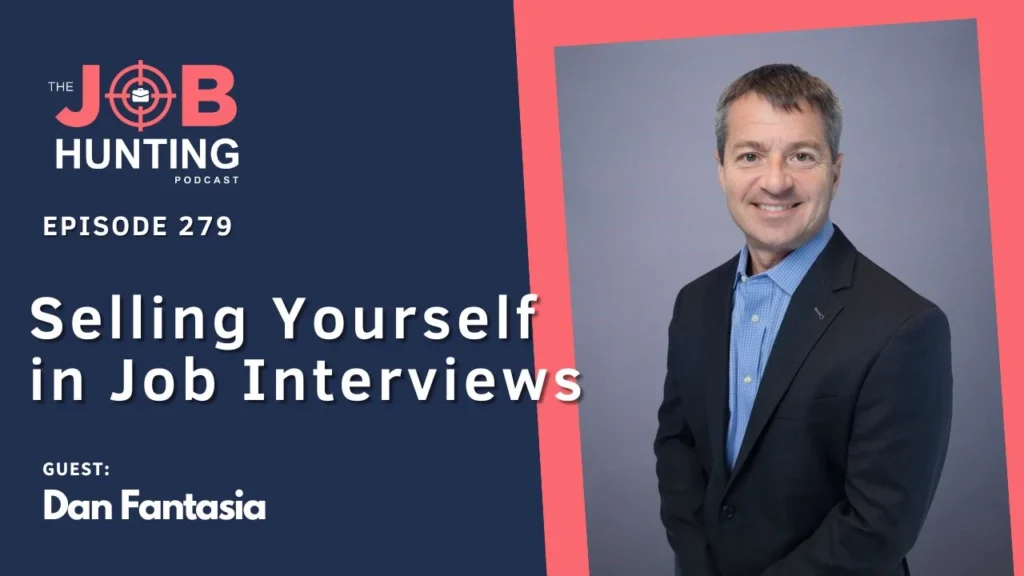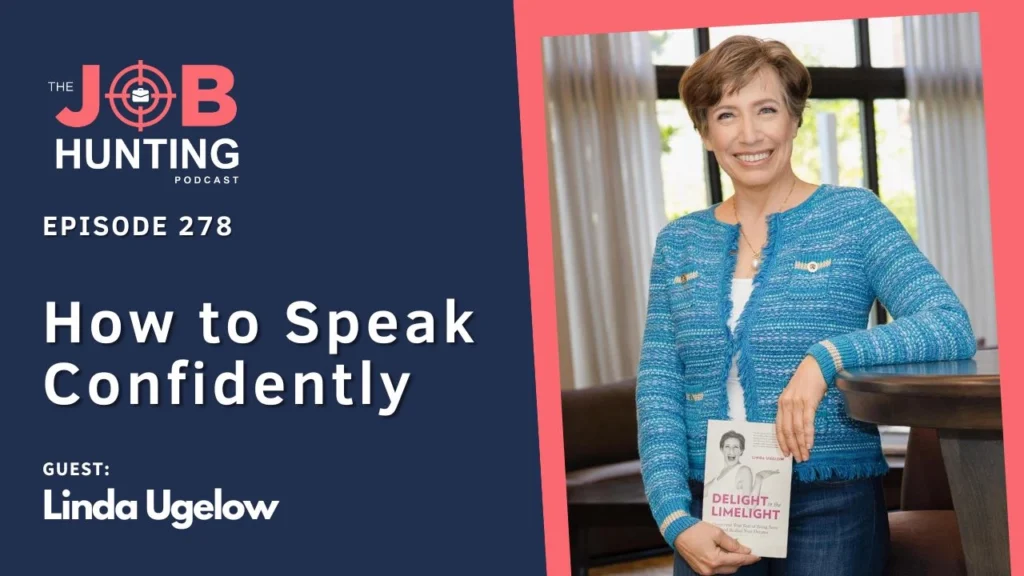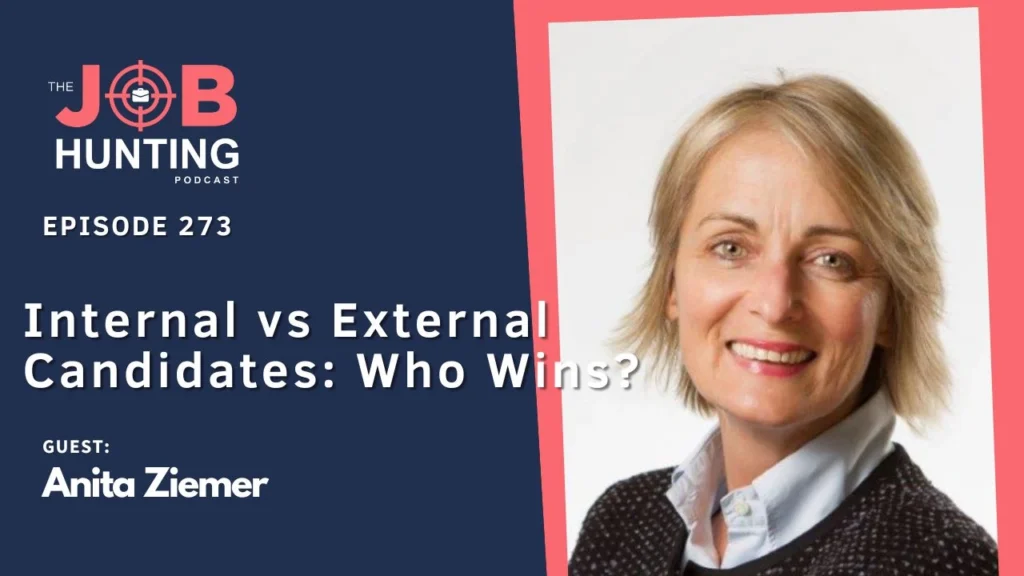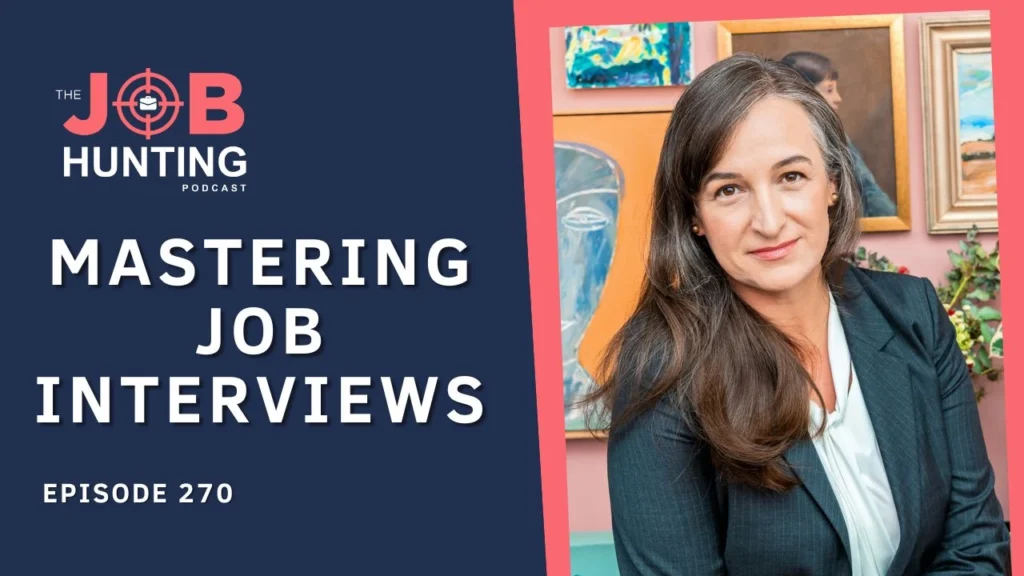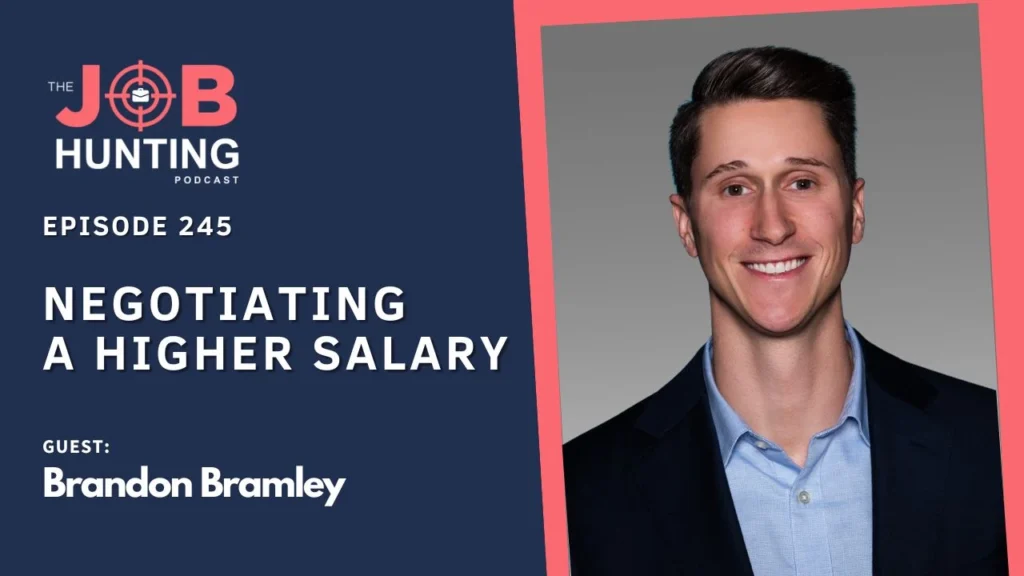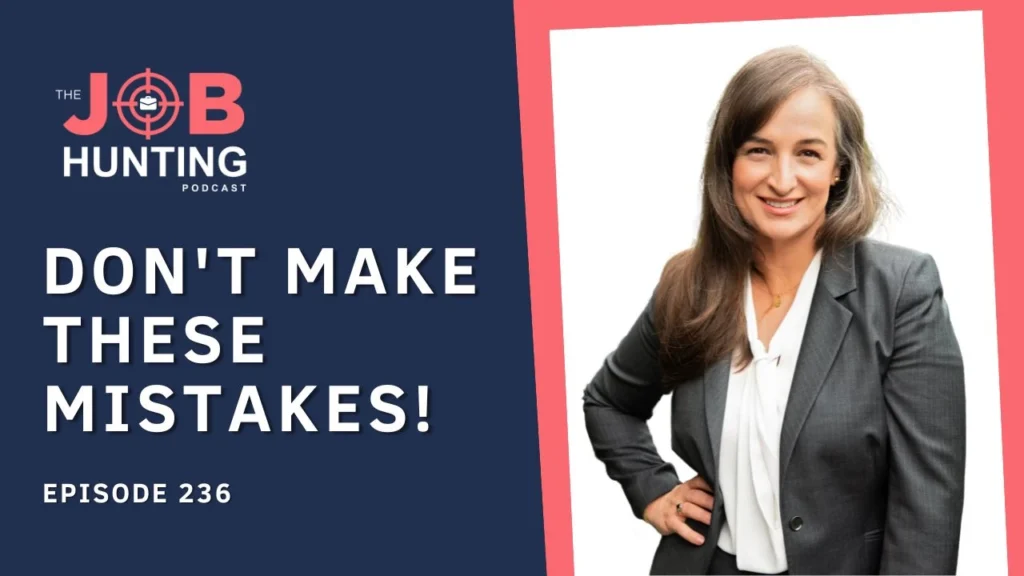Renata: Hello, and welcome back to The Job Hunting Podcast, job hunters and career enthusiasts. In this episode, number 82, we are going to be discussing how you can show executive presence in a job interview. Now, I think I want to make this very clear. You can learn to lead. You can learn to be a leader, not only by acquiring skills and experience but also by having an image that reflects leadership, confidence, and trustworthiness, likability. All of the characteristics of someone who is going to be in charge. And in this episode, we’re going to be discussing how important it is to have that executive presence when you walk into a job interview and how you present your skills and experience to the interviewers that we’ll be talking to you at that crucial time. And how important it is for you to prepare not only to answer the questions but to have that body language, that tone that gravitas, and the right communication strategies to portray yourself as the best candidate for the job.
Renata: But before we dive into it, I want to remind you that I have free resources for you. If you’re job hunting or planning the next steps in your career, I will invite you now to subscribe to my email list. Or you can go to these episode show notes, and there will be a link for you to subscribe there. And if you do so, I will send you the two documents that I give all my clients, my guidebook, and my most important email template. The guidebook is called ‘My top 10 tips to making job hunting more successful and less stressful.’ And I want to talk to you a little bit about this document, which I put together. Very sad day for me, it was the day that a good friend of mine passed away. His name was, is Tim Fisher, and he was the former deputy prime minister of Australia. And when I started in my role as CEO of the John Monash Foundation, one of the first people that I met in that role was Tim, because the foundation existed basically because of his passion and advocacy for a prestigious scholarship program in Australia to be named after a national hero, John Monash.
Renata: General Sir John Monash was an amazing general in the first world war and had an incredible career full of ups and downs. Frankly, he wasn’t a perfect man, and things didn’t work out perfectly from the get-go for him, but gosh, he really made lemonades out of lemons and really persevered and was very strategic, very smart, very entrepreneurial, a lover of the arts as well as science, really holistic Renaissance type of man. And we then, you know, named this incredible prestigious national scholarship after him for that reason. Now Tim Fisher passed away a few years ago, and he was a man of incredible presence and really a great leader in politics and outside of politics. Serving his community so well over the years, being so loved by all sides of politics. And, you know, at times when we go through a crisis here in Australia, we do miss how level-headed he was.
Renata: Tim had a document that he used to give parliamentarians, and it had his top 10 tips to survive parliament. And in fact, when I started as the CEO of the John Monash Foundation, I remember he gave me that document as well. He sent it to me by email, and I read it, and I thought it was really interesting. It didn’t really apply to my position as CEO. Most of them, I will have a link to it below. It’s a very interesting and very true list of 10 tips for parliamentarians, and I loved that he sent it to me as well. There is a lot of politics in being a CEO and dealing with a board, I think he knew that. So when he passed away, those 10 tips were the circulated around via Twitter. And then some newspaper is published, the 10 tips that he used to send around to parliamentarians, to new parliamentarians.
Renata: And I sat down, and I wrote my top 10 tips for making job hunting more successful and less stressful, inspired by my friend and that document. Tim made you feel very special, and he made you feel like you were his very best friend. And when I attended his funeral, I realized that everybody in that room, where there were hundreds of people, many high profile politicians and journalists, and businessmen and women there as well. And they all had wonderful stories to say about Tim. And, I made some great friends that day as well. Some very interesting people that I met at Tim’s funeral, and we shared amazing stories. He was a great mentor to me during my time at the John Monash Foundation.
Renata: I don’t think there was a month that I wouldn’t hear from him and that he wouldn’t stop by to say hi and see how I was. And he always remembered everything, you know, about my parents and my kids and my husband and my family. Always asked about everybody. And then we’d get down to business, and we would discuss what was going on with the foundation. He was a member and a former director of the foundation. And one of the reasons why the foundation existed, as I mentioned before. And I remember one day being at an event where I attended because of my position of being CEO of that foundation. And it was maybe my first month or my second month into the job. And, there were few seats available for that function. And a lot of people would be standing up, and I was standing up because there were people that were older than me in the room.
Renata: There were some war veterans there, and I felt like I had to leave the seats available for other people. And Tim came to me and whispered in my ear, ‘you need to sit down now, and you are sitting on the front row.’ And that’s when I realized that there is a responsibility of being the CEO of that foundation. And that requires me to have the executive presence, to know where I stand. And I then promptly followed his advice and sat on the front row and felt comfortable doing so. And in the end, everybody that was elderly also had to sit to feel comfortable in what was a pretty long ceremony. I remember at the shrine of remembrance here in Melbourne. But, I think that says a lot about what is needed for you to advance in your career and have the skills, the experience, and the executive presence to lead. And for that reason, I invite you once again to download the document and download the email template that I have for you, which I give to all my clients, and join my mailing list so that I can support you as you advance in your career and reach your goals for whatever it is that you want to achieve in your corporate job.
Renata: Now, without further ado, let’s dive into this topic, shall we? How do we show executive presence in a job interview? Now last week, I recorded, and you now have access to episode 81, where I discuss how coffee can help you with a job interview and getting you ready to perform at your best. Sorry, not just coffee, but caffeine. If you like a red bull, or if you chew caffeinated gum or drink a lot of tea, that can all help you perform at your best. And then hopefully you will feel relaxed, prepared. You would have prepared for answering the most common questions. And the next thing you need to make sure that you portray is executive presence. Are you ready to take on the responsibility of the job you are applying for?
Renata: So it’s not just, career advancement is not just about your skills and your experience and how people measure them. There is also image. And it is a precondition for success, regardless of the sector that you’re in. If you’re going to be moving from being an individual contributor to being a supervisor or a team leader, to being a middle manager, and then going up to becoming a senior executive, and then potentially a board member, you need to know where you stand and how to represent the organization at those different levels. As people say, we know a leader when we see them. There is an ‘It’ factor that needs to be matched by your skills and experience for you to advance in your career. You might feel that you’re ready, that you have accumulated all the tools and resources, and experience to move up and advance in your career. But do you have the gravitas? Can you communicate well? And is your appearance also matching what is expected of a person in that position that you’re applying for or wanting to be promoted to in the sector industry that you’re working in?
Renata: I don’t claim to change the world. My claim is to help people advance in their careers and to play with what we’ve got. I may not like how the world goes round, but I really want the best possible candidate and my clients to get the jobs that they want. And for that reason, I know what plays into the minds of people that are selecting candidates. And these dimensions all will affect people’s choice really when they are choosing candidates. So all of this is important for job candidates to know. Now you may want to be the black sheep. You may want to be the dark horse. I have to admit personally, that’s where I play at my best when I’m challenging the status quo when I am going against the grain, but I know that I’m doing that. And I know that there is a risk to it.
Renata: What really breaks my heart is when job candidates don’t know that they are making a mistake or that they’re taking a bigger risk by doing something that is counter-culture. So, it’s okay to develop your own unique style and persona and brand, but you have to know that it will be a very big adventure, but also potentially a bit harder for you at certain points of your career. So it’s important for me to at least make you aware so that you can make your own decisions and devise your own best strategy for your career advancement.
Renata: Ok, so what are these dimensions that can impact executive presence during a job interview? And if you’re not going into a job interview, but for example, you’re starting a new job, and you’re meeting your team and your colleagues for the first time, or you’re walking into a room to do a presentation for a client or a presentation for your colleagues. It’s the same thing. So you can adapt what I’m about to say to different types of high-pressure environments in the corporate sector. But you know, this is The Job Hunting Podcast, so I talk about job interviews most of the time. And I would invite you to extrapolate and use these ideas for other types of high-pressure meetings and presentations that you may have to do during your career.
Renata: So the first thing I wanted to talk to you is about confidence and composure under fire. When you walk into a job interview, you feel like you are under threat. Maybe you, in your mind, know exactly that this is just the job interview and nothing horrible is going to happen to you. It’s not like a death sentence or anything. But our body has been designed to react in a very quick way to threats, and that’s how you are going to be reacting. Your heart rate might go up a little bit. You might get a bit sweaty. Your brain function is not going to be as good as when you are relaxed. So really, taking deep breaths, walking into an interview, being mindful of your posture and your body language will help you immensely to find that ease to go on and be in that room for the next 30, 40 minutes. In fact, as you feel more and more comfortable, because 90% of the time, the interviewers will make their best effort, effort to make you feel comfortable, right?
Renata: So, as you ease into the interview, you will start to relax and feel more comfortable, and you will find it easier to answer questions mainly about 15 to 20 minutes into the interview. So be mindful at the beginning that you really have to take extra attention so that it doesn’t look like you are too shaky or nervous or anxious about the interview itself. I worry about saying the word confidence, many coaches have that concern, at least the good ones, because I don’t want people to understand confidence as somebody who has this very big type A extroverted energy or big personality. I have read a lot of great articles from good coaches that are concerned about people equating confidence with those other qualities, and it’s not true.
Renata: Introverts, type B personalities, can also be very confident as they walk into an interview, and they can advance in their career and take more senior roles. I don’t want you to feel like because you’re not an extrovert and you don’t have a big energy, big personality, that you can’t take up more responsibilities in your organization or another organization. That’s absolutely not true. So that is of walking into an interview, being authentic, having this great positive energy instead of a big type A energy, allows you to demonstrate that you are smart, that you have the skills, that you have the experience, without being too worried about the extra work that you need to do.
Renata: So walking into that room with a quiet energy but a positive energy will help you immensely. Remember to smile, remember to walk in, and either shake hands if you’re allowed to, after the pandemic, you have to double-check wherever you are in the world. But at least making eye contact and having the posture of openness towards the people that are interviewing you. Be aware not to cross your legs, be aware not to cross your arms, have a very open, trustworthy posture as you sit down. Or even in zoom, there are ways that you can showcase that as well, by making sure that the video of the zoom call or any type of video app that you’re using shows not only your face and your neck but also a bit of your torso. And hopefully, it’s able to show a bit of your hands as well. So those gestures and posture will help you and present yourself with confidence.
Renata: And the composure under fire is also very important. You need to understand that it’s just an interview. And the worst thing that can happen is you don’t get a job. Remember, you don’t have that job anyway. So, you know, you’re going to be in a neutral zone. Now you may be very anxious to get a job. You may be very anxious to have income again, and I completely a hundred percent understand you and where you are. I’ve been there myself. Believe me, if you know a little bit about my story, if you’ve listened to my story in my podcast or read it on my website, you will know that no joke, I have been in that situation. But you and I are going to die. It’s nothing terrible is going to happen to you if you don’t get that job, believe me. Believe in yourself so that you can have that ease and that composure under fire to really perform well and hopefully get that job.
Renata: And even if you don’t get that job, you will have experienced that stress of the job interview so that next time you have a job interview, your body is going to react in a much more mild way to that stress. You’re not going to be as stressed in the second interview as you were in your first interview, right? Now, if you wait five years and then have interviews again, it resets, okay? So you are going to be once again lacking in confidence and feeling a bit all over the place like you don’t belong and you haven’t had that experience in a while, you will feel out of place. You don’t know if you’re doing the right thing by being in that interview.
Renata: So yes, if you have been away from the job hunting and the job market for a while, it resets. So remember that it’s important to go through interviews to get better at it, and finally get your new job.
Renata: The second dimension I want to discuss that really impacts your executive presence is decisiveness in how you answer questions. Decisiveness is not just about having confidence in your answer as in what you can do for that organization and in this new role but also having the courage to speak up. My son was telling me he was interviewed for an internship, a job that he actually got. So I’m very happy for him. And in that interview, they asked him what he thought about the company’s website. And he was honest, apparently, the website wasn’t very good and, you know, it could be greatly improved. And having that courage, that decisiveness, and having the confidence to speak up and talk truth to power is really important.
Renata: And that’s the next dimension really – speaking truth to power. It’s very important if you’re advancing in your career if you’re moving upwards for the upward mobility to happen, that you are able to manage up.
Renata: Now, we don’t sometimes know what that means. Even though, in theory, we hear a lot about managing up. It’s really about speaking truth to power and how to do that diplomatically. How to be at ease with the politics and understanding what is at times very common in the corporate sector, matrix structures, and being able to say things to people that are your superiors without burning any bridges and committing any career-limiting moves or CLMs, as we say. It’s very important if you have some sort of consultancy role, project management role, you really need to have the spine to share your convictions in a way that doesn’t upset people and doesn’t burn your chances. And there are times when I have spoken to clients of mine that were absolutely in the right about what they were saying about the issues in the organizations. It was really how they said it that was really inappropriate.
Renata: And we needed to find different ways to communicate the message that was going to be positive and constructive feedback for the organization to actually change, evolve, and grow. So it’s not really about being right or wrong. It’s about how you can tell a story that enables positive change. So speaking truth to power is an important ability and a skill that sometimes you may need coaching to help you learn how to do. And it could be really impacting your upward mobility if you’re feeling stuck and you’re not getting the jobs that you want. It’s about, you know, the ability to walk into a room with decision-makers and challenge authority. And sometimes that challenge will happen during your job interview like it happened with my son, for example.
Renata: Another dimension and the final one that I want to speak to in today’s podcast is your tone of voice and your inflection. And this is something I’ve been thinking about quite a lot. I know that there are coaches that will help you with tone and inflection and the way that you communicate on stage. I’m not really sure that they have thought about job interviews and just more normal meeting situations, negotiations, and so on. But if you naturally have a tone of voice that is very monotone and have a cadence that’s not very energetic, that can be even exacerbated when you are in a highly stressful situation, like a job interview. So learning how to have a more engaging voice, one that tells a story and makes people want to hear more and more from you, is really important in an interview environment. And you may want to discuss that with a coach. So if you are interested in learning more about that, get in touch with me, and may be able to recommend you to a few people that I know that work online and can help you with that.
Renata: Because I would point out to clients of mine if I think that they need coaching in that regard, but it’s not the sort of coaching that I do. But it’s important because nothing in an interview can be taken for granted. It’s the reason why you will get a job or not. There are only two or three or maybe four people going through that interview process, and you have a 25% or a 33% or a 50% chance. So you really need to take care of all those details. For example, small talk is not really a small talk in an interview setting. Everything that is in verbal communication, body language, all the ways that you communicate your executive presence during that 30 minutes to 60-minute interview is important for you to increase your success rate and get the job. So how you speak does matter. Your cadence and your tone does matter, especially if you will be applying for a job that requires team leadership and a lot of communication, and people want to make sure that you will have the right inflection tone of what is expected of a leader, so make sure that you address that.
Renata: Next week, I will be launching another podcast where we are going to be talking about other issues affecting executive presence during a job interview. Especially your attire and how to dress appropriately, a little bit more about body language, posture. And also the emotional intelligence to read the room and decide when is a good time to talk, when is a good time to stop talking. And all of those things are, once again, equally important as your behavioral questions that you are practicing for. So you have to have a very holistic preparation for job interviews. And I know it’s a lot, but once you start doing it and you understand how important it is, that will flow into your leadership style and help you throughout your career and not just at that point in time when you are changing jobs, changing careers, or advancing to a new role. You will see that this is going to be an important part of being a corporate professional, that you will learn how to present yourself well in the presence of others and the high pressure.
Renata: Once again, don’t forget to sign up for my newsletter, be part of my mailing list so that I can send you my top 10 tips for helping you making job hunting more successful and less stressful. And I will also send you my most favorite email template to help you connect with recruiters and head hunters. And I can’t wait to have you on my mailing list so that I can send you a newsletter every week with the next episodes of The Job Hunting Podcast and share with you news and advice, curated articles that I only share with my mailing list. So look forward to seeing you being part of that bye for now and until next time.


